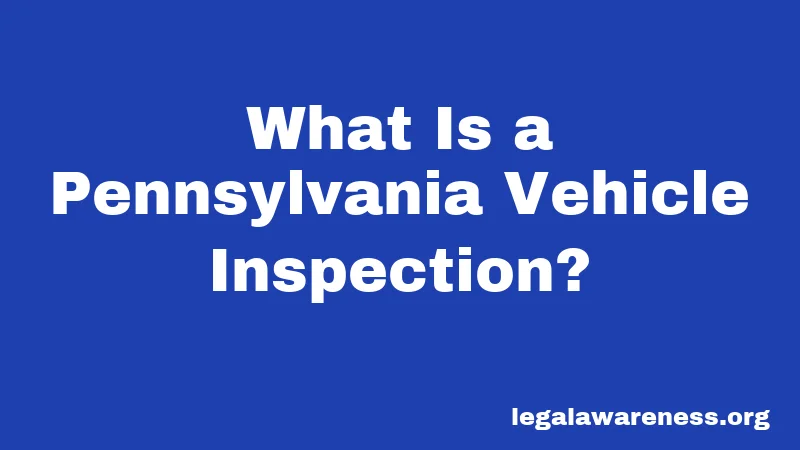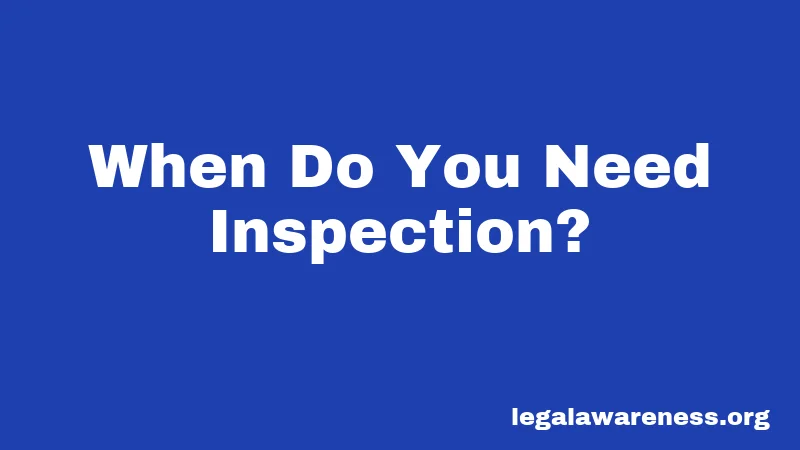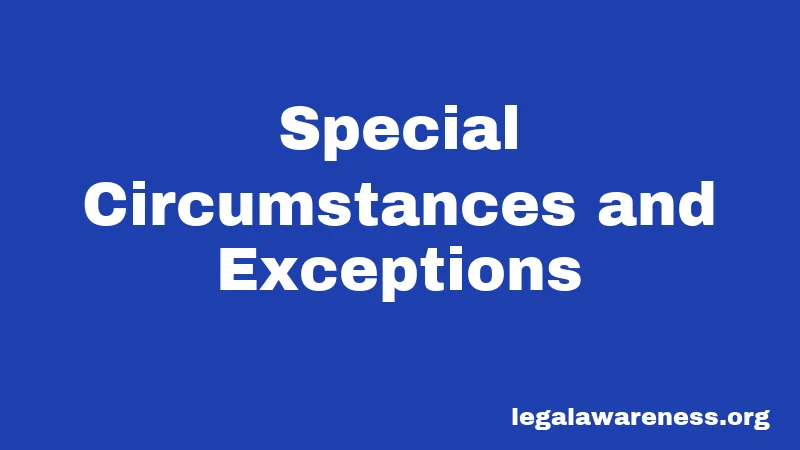Pennsylvania Vehicle Inspection Laws in 2026: Essential Rules You Can’t Ignore
Most people think Pennsylvania inspection laws are simple. You get inspected once a year. Done, right?
Wrong. Honestly, there’s a lot more happening behind the scenes. Pennsylvania takes vehicle inspections seriously. The state has strict rules about what gets checked, when you need it done, and what happens if you don’t comply. And penalties? They can bite hard.
Let’s break down exactly what you need to know about Pennsylvania inspection laws so you stay on the right side of the law.
What Is a Pennsylvania Vehicle Inspection?

Pennsylvania requires all registered vehicles to pass both a safety inspection and an emissions test. Think of it like a health checkup for your car. The inspection makes sure your vehicle is safe to drive on Pennsylvania roads.
Here’s the thing: Pennsylvania is one of only 14 states still requiring annual inspections. Most people don’t realize how strict this requirement actually is. Your vehicle can’t hit the road without passing both inspections, period.
The safety inspection checks things like brakes, steering, suspension, and tires. The emissions test ensures your vehicle isn’t polluting the air too much. Both are required every single year for most vehicles.
Basic Safety Inspection Requirements
What Gets Checked During Inspection
An official inspection includes checking your engine mount, brakes, tire tread depth, exhaust system, steering, and suspension. The mechanic also does a test drive to make sure everything sounds right and works properly.
You’re also required to have current registration and insurance before inspection. The Vehicle Identification Number (VIN) on your registration must match the VIN on your vehicle. Seems obvious, but it’s a requirement inspectors verify.
Sound like a lot? Actually, it’s pretty straightforward. Most mechanics can complete both inspections in 30 minutes or so.
The inspection sticker costs around $11 plus the mechanic’s service fee, which typically runs $40 to $80 depending on your location. Electric vehicles don’t need the emissions test, so they save a little money there.
Emissions Testing
Nearly all Pennsylvania vehicles need an emissions test as part of their annual inspection. The test measures your vehicle’s pollutants to make sure it meets air quality standards.
Wait, here’s important: some counties don’t require emissions tests. If you live in Adams, Armstrong, Bedford, Bradford, Butler, or certain other rural Pennsylvania counties, you’re exempt from emissions testing. You still need the safety inspection, though.
The emissions test is basically required by the federal government. Even though some Pennsylvania lawmakers have talked about eliminating annual inspections, federal law means emissions testing will stay in place no matter what.
When Do You Need Inspection?

Your vehicle inspection expires on the last day of the month shown on your sticker. If your sticker says 12, it expires December 31. Simple system, right?
Here’s where people get confused: You have a grace period. If your inspection expires, you can drive to an inspection station for 10 days to get it renewed. But technically, you’re only supposed to drive directly to the station. Don’t stop at the store or take a detour.
New vehicle owners get 10 days after purchase to complete their first inspection. Same thing if you just moved to Pennsylvania—you get 10 days to get your out-of-state vehicle inspected.
If your vehicle has been outside Pennsylvania for 30 days or more, you get 10 days after returning to get inspected. That’s a nice grace period for people who winter in Florida or travel for long periods.
Penalties and Consequences
Fine for Expired or Missing Inspection
This part matters. Driving with an expired inspection sticker comes with a $25 fine. But here’s the catch: when you add court costs and fees, you’re looking at around $100 total.
No inspection at all? That fine can jump to around $200 when court costs are included. It’s a summary offense, which means you won’t go to jail just for this violation. But you definitely don’t want the ticket.
The good news? An expired inspection isn’t a moving violation. It won’t add points to your driving record, so it won’t affect your insurance rates.
Penalties for Commercial Vehicles
Now this gets serious. If you’re driving a motor carrier vehicle, bus, or school bus without valid inspection, the penalties increase dramatically. You’re looking at a fine between $100 and $500. In some cases, you could face jail time up to 90 days.
Police officers have authority to pull your commercial vehicle out of service immediately. You can’t drive it anywhere until you get a valid inspection certificate. That can shut down your whole operation.
Fake or Stolen Inspection Stickers
Display a fake inspection sticker? That’s a $100 fine for your first offense. But get caught again, and you’re facing $200 to $500 in fines plus potentially 90 days in jail.
Using a sticker from another vehicle is also illegal. Don’t think you can borrow your friend’s inspection or use an old one from your previous car. It won’t work and it’s a crime.
Special Circumstances and Exceptions

Which Vehicles Are Exempt
Not every vehicle needs an inspection. Here’s what’s exempt:
Antique vehicles registered as antiques are totally exempt. Motorized pedalcycles don’t need inspection. Farm vehicles (with certain weight restrictions) can get a Type D exemption that allows driving without annual inspection.
Trailers weighing 3,000 pounds or less are exempt. Vehicles being rebuilt or in manufacturing process are exempt until they’re sold. Military vehicles used for training at certain institutions are also exempt.
Special mobile equipment and implements of husbandry don’t need inspection. And if you’re getting your car repossessed or transporting it to an auction, you have an exemption for that specific trip.
Vehicles with a valid Federal inspection certificate for trailers don’t need the Pennsylvania certificate. These exceptions exist for good reasons, mostly for commercial and agricultural operations.
New Dealer Requirements (Updated August 2024)
This is important if you’re buying from a Pennsylvania dealership. New rules started August 19, 2024, and they protect you as a buyer.
Dealers must now inspect every vehicle within 30 days of adding it to their inventory. If the car drives 500 miles before being sold, it needs another inspection. No exceptions.
Here’s the critical part: dealers must disclose any damage in writing before selling the vehicle. We’re talking frame issues, engine problems, transmission defects, flood damage, and inspection failures. They have to tell you in writing even if they’re selling it “as is.” The law changed specifically to protect buyers from hidden problems.
How to Get Your Vehicle Inspected
Find a certified inspection station near you. Most mechanics, dealerships, and service centers perform inspections. You can check the Pennsylvania DMV website for a list of approved stations.
Call ahead and schedule an appointment if possible. It makes the process faster and you don’t have to wait around.
Bring your registration and proof of insurance. Have your keys ready for the test drive portion. The whole process typically takes 30 to 60 minutes depending on how busy the station is.
Pay the fee (usually $40 to $80 plus the $11 state fee). You’ll get your sticker to display on your windshield. Pennsylvania law requires you to display it prominently as directed by the state.
Keep your receipt and documentation of your inspection. If you get stopped by police, this proof is your evidence that you’re compliant.
Recent Law Changes and What’s Coming
Here’s something people are talking about: Pennsylvania legislators have proposed eliminating annual inspections. One state senator introduced a bill that would only require inspections when vehicles are sold or titles are transferred.
But hold on—this hasn’t happened yet. As of 2026, annual inspections are still absolutely required. There’s no legislation currently signed into law changing this. Don’t let social media posts confuse you. The rumor that Pennsylvania ended inspections in 2025 is completely false.
Emissions testing is federally mandated, so that’s staying no matter what happens with safety inspections. Even if annual inspections are eliminated in the future, you’d still need to pass emissions tests.
The dealer inspection rules changed in August 2024, adding protections for consumers. This is worth knowing about when you buy used cars in Pennsylvania.
Philadelphia Special Rules
Here’s something interesting: Philadelphia has different rules. The city’s Driving Equality Law, which started in 2022, limits police traffic stops for certain violations.
Philadelphia police are basically banned from stopping you solely for expired inspection or missing emission inspection evidence. The intent was to reduce traffic stops that could disproportionately affect certain communities.
But this only applies to Philadelphia. Everywhere else in Pennsylvania, police can absolutely stop you for inspection violations.
Frequently Asked Questions
Can I drive with an expired inspection if I have an appointment scheduled? Yes, you have a 10-day grace period to drive to your inspection appointment if your sticker has expired. But only if you actually have an appointment and you’re driving directly to the station.
Do electric vehicles need inspections in Pennsylvania? Yes, electric vehicles still need the safety inspection. They skip the emissions test, which saves time and money. But they absolutely must have the safety inspection.
What if I just moved to Pennsylvania? How long before I need inspection? You have 10 days after establishing Pennsylvania residency to get your vehicle inspected. After those 10 days, driving without valid inspection can result in a fine.
Will an inspection ticket affect my insurance rates? No. An expired inspection is a non-moving violation and doesn’t add points to your driving record. Insurance companies don’t see it as a major violation.
Is the 2025 ending of inspections thing real? Absolutely not. This is a false rumor that circulated on social media. Pennsylvania still requires annual inspections. There’s no law eliminating them. Don’t fall for this one.
Final Thoughts
Pennsylvania takes vehicle safety seriously, and that means you need to take your annual inspection seriously too. It’s not complicated. Get inspected once a year. Display your sticker. Keep your receipt.
The penalties for not inspecting your vehicle aren’t severe compared to other violations. But why risk getting stopped, paying a fine, and dealing with frustration? It’s easier to just schedule your inspection and keep your vehicle compliant.
Check the Pennsylvania DMV website for approved inspection stations. Mark your calendar when your sticker expires. Make your appointment before your sticker actually expires so you don’t stress.
Stay informed, stay safe, and keep your vehicle road-legal. Questions about your specific situation? Contact your local police department or PennDOT for clarification.
References
- Pennsylvania Department of Transportation (PennDOT) – Vehicle Inspection Information
- 75 Pennsylvania Consolidated Statutes § 4703 – Operation of Vehicle Without Official Certificate of Inspection
- Pennsylvania Vehicle Code Title 75, Chapter 47 – Official Assembly Website
- PA Attorney General – Automotive Industry Trade Practices Updated August 19, 2024
- FOX 43 – Pennsylvania State Vehicle Inspections Not Stopping in 2025 Verification
- Understanding Vehicle Inspection Laws & Exceptions in Pennsylvania – Legal Overview
